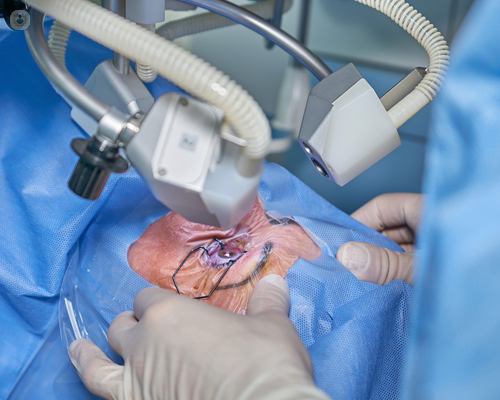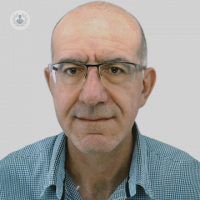Cataract surgery and its latest advances
Written in association with:Understanding cataract surgery and its latest advances can help patients make informed decisions about their eye health. With modern surgical techniques and advanced intraocular lenses, cataract surgery can significantly improve vision and quality of life. Mr Ayman Khaier answers some of the most frequently asked questions about cataract surgery here.

Cataract surgery is a medical procedure performed to remove the lens of the eye when it becomes cloudy due to cataracts. A cataract is a common condition, particularly among older adults, where the normally clear lens of the eye becomes opaque, leading to blurred vision and, if left untreated, blindness. The surgery involves removing the affected lens and usually replacing it with an artificial intraocular lens (IOL).
When should one consider cataract surgery?
Cataract surgery is typically recommended when the cataracts begin to significantly impair vision and interfere with daily activities, such as reading, driving, or recognising faces. An ophthalmologist will assess the severity of the cataract and its impact on the patient's quality of life. In many cases, people live with mild cataracts for years without needing surgery. However, when vision loss starts to affect everyday tasks, it is time to consider the procedure.
How is cataract surgery performed?
Cataract surgery is usually an outpatient procedure, meaning patients can go home the same day. The most common method is phacoemulsification, where a small incision is made in the eye, and an ultrasonic device is used to break up the cloudy lens into tiny pieces, which are then suctioned out. After removing the lens, the surgeon inserts an artificial intraocular lens (IOL) to restore clear vision. The procedure typically takes about 30 minutes, and patients are awake but sedated to ensure comfort.
What are the latest advances in cataract surgery?
Recent advances in cataract surgery have improved both the safety and effectiveness of the procedure. One significant advancement is the use of femtosecond laser technology, which allows for more precise incisions and lens fragmentation. This laser-assisted cataract surgery can result in faster recovery times and improved visual outcomes.
Another notable development is the introduction of premium intraocular lenses (IOLs). Traditional IOLs are monofocal, providing clear vision at one distance, usually far. However, newer multifocal and accommodating IOLs can provide clear vision at multiple distances, reducing the need for glasses or contact lenses after surgery. There are also toric IOLs available for patients with astigmatism, offering better correction of vision issues.
What can patients expect during recovery?
Recovery from cataract surgery is generally quick and uncomplicated. Most patients notice an improvement in their vision within a few days. However, it may take several weeks for the eye to heal completely. During the recovery period, patients may experience mild discomfort, itching, or sensitivity to light. An ophthalmologist will provide specific post-operative instructions, including using prescribed eye drops to prevent infection and reduce inflammation. Follow-up appointments will be scheduled to monitor the healing process and ensure the best visual outcome.
Are there any risks associated with cataract surgery?
Cataract surgery is one of the most commonly performed and safest surgical procedures. However, as with any surgery, there are potential risks. These may include:
- infection;
- bleeding;
- inflammation, or;
- swelling.
In rare cases, complications such as retinal detachment or a dislocated intraocular lens may occur. Most complications can be effectively managed with prompt medical attention. It is important for patients to discuss any concerns with their ophthalmologist before the procedure.
What’s involved in preparation for cataract surgery?
Preparation for cataract surgery involves a comprehensive eye examination and consultation with an ophthalmologist. Patients may need to stop taking certain medications before the surgery. It is also essential to arrange for transportation home after the procedure, as vision may be temporarily impaired. Following the surgeon’s pre-operative instructions can help ensure a smooth and successful surgery.
If you have any concerns or questions, consult with a specialist to explore the best options for your specific needs.
Arrange a consultation with Mr Khaier via his Top Doctors profile.


